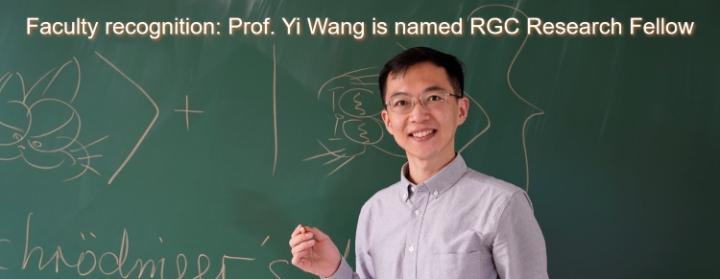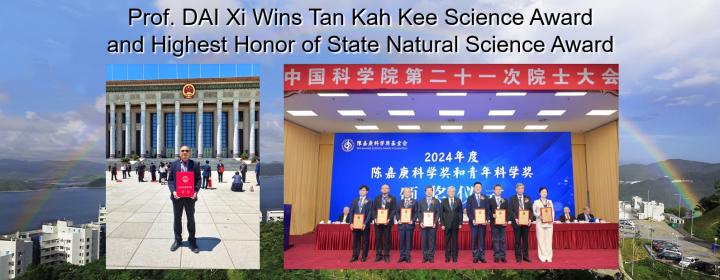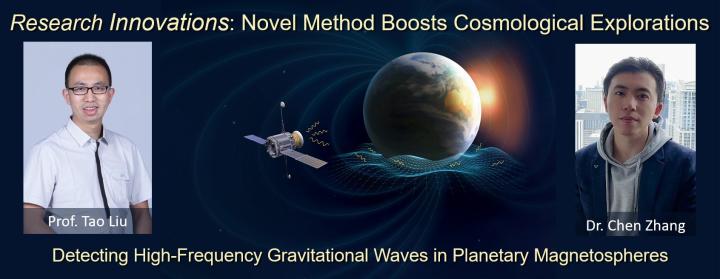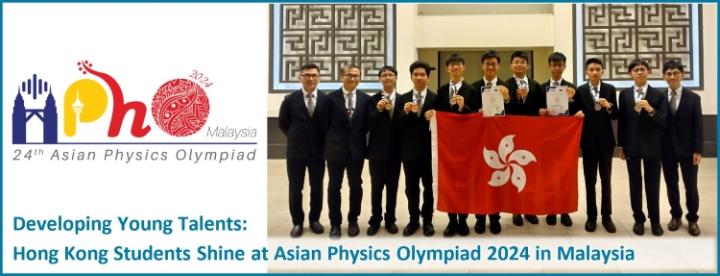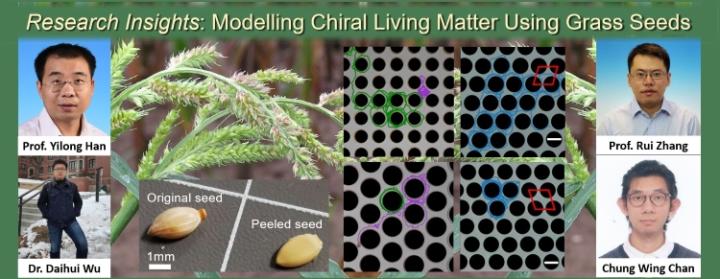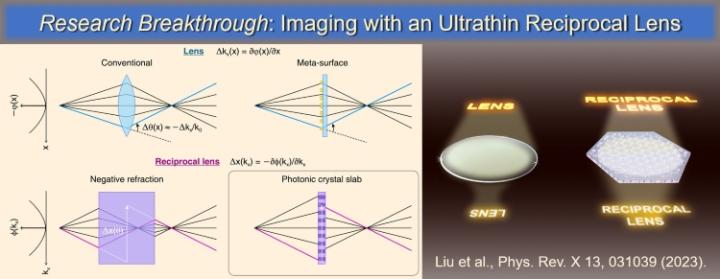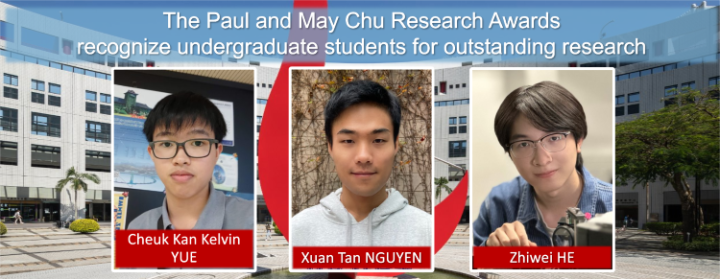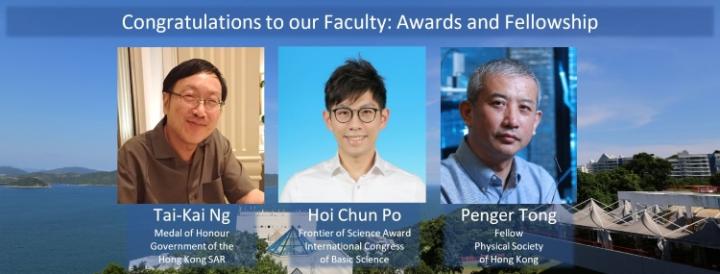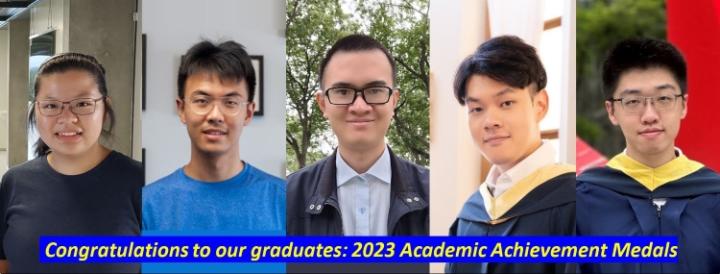News & Events
2024-06-12
Eight talented secondary school students from Hong Kong achieved excellent results at the 24th Asian Physics Olympiad (APhO 2024) held in Malaysia from 3-10 June 2024. The Hong Kong APhO team members were Chan Hoi-chi (Hong Kong Chinese Women's Club College), Edison Fu (Queen's College), Leung Chi-fung (Evangel College), Liu Lincoln (Sha Tin College) Matthew Mui (The Hong Kong Sze Yap Commercial and Industrial Association Wong Tai Shan Memorial College), Marcus Poon (Po Leung Kuk Choi Kai Yau School), Michael Tang (St. Joseph's College), and Yan King-yiu (Queen Elizabeth School). Competing among over 200 students from 27 countries or cities, the team won one gold medal (Liu), three silver medals (Leung, Fu, Yan), two bronze medals (Mui, Tang), and two honourable mentions (Chan, Poon), and was ranked 8th among all teams at the competition. The team was trained and mentored this year by Dr. Ting-Pong Choy, Prof. Adrian Po, and Prof. Jensen Li of the HKUST Department of Physics, with the support of the Education Bureau and the Hong Kong Academy for Gifted Education.
The HKUST Department of Physics has been providing training to about 90 secondary school students to prepare for the Asian Physics Olympiad since 2007 and the International Physics Olympiad since 2003. The year-long training program offered to these gifted students covers a wide range of topics, from Newtonian mechanics to modern physics, both in theory and experiment. The team members that eventually participate in the APhO and IPhO competitions are chosen based on their performance in a series of selection tests and competitions during their training. The Hong Kong teams under the mentorship of the Department faculty were awarded an aggregate of 148 gold, silver and bronze medals in APhO and IPhO competitions up to and including 2024. Participation in Physics Olympics training and competition develops students’ potential and serves as a springboard for pursuing interests in physics and many other subjects at top universities and beyond.
Accompanying photo (left to right): Mr Yu Kam Fung (Tak Nga Secondary School), Dr. Ting-Pong Choy (HKUST), Liu Lincoln (Sha Tin College), Matthew Mui (The Hong Kong Sze Yap Commercial and Industrial Association Wong Tai Shan Memorial College), Yan King-yiu (Queen Elizabeth School), Marcus Poon (Po Leung Kuk Choi Kai Yau School), Michael Tang (St. Joseph's College), Chan Hoi Chi (Hong Kong Chinese Women's Club College), Edison Fu (Queen's College), Leung Chi-fung (Evangel College), Prof. Adrian Po (HKUST).
News and announcements:
The Government of the HKSAR press release (Chinese)
The Government of the HKSAR press release (English)
The Standard Read more
The Government of the HKSAR press release (Chinese)
The Government of the HKSAR press release (English)
The Standard Read more
2024-05-22
The structures of biological materials, commonly called “living matter”, such as DNA, proteins, bacterial flagella, and flower petals to name a few, are predominately chiral. However, the origin of the prevalence of one type of handedness over the other in this part of nature remains a mystery, despite knowledge of its existence for hundreds or thousands of years. When living matter self-propel, they also exhibit handedness, a notable example of which is the tendency of bacteria to swim in a circle near a surface. Therefore, understanding how self-propelling or active chiral living matter self-organize, navigate, and transport in complex environments will help us decipher the mechanisms of living systems. Moreover, identifying and sorting different cells or microorganisms according to their degree of activity and chirality holds great promise for applications such as diagnostics, omics, and drug delivery. However, the interactions between these chiral active matter and their environment are notoriously difficult to examine, which impedes their further study.
Prof. Rui Zhang and Prof. Yilong Han and members of their research groups in the HKUST Department of Physics, Chung Wing Chan, Daihui Wu, Kaiyao Qiao, and Kin Long Fong, explored the intriguing behavior exhibited by chiral active matter using a simple platform with the help of Prof. Zhiyu Yang of the same department. Prof. Han discovered that Echinochloa crus-galli grass seed has chiral surface ridges that give rise to circular or linear motion when it is propelled under the application of external vibrations. Careful studies of the seed particle motion on a vibrating stage performed by Dr. Wu, Mr. Qiao, and Mr. Chan under the guidance of Prof. Han and Prof. Yang revealed that an active Brownian dynamics model can capture the seed dynamics well.
Mr. Fong and Mr. Chan developed a simulation model with Prof. Zhang’s guidance, which they used to examine the dynamics of chiral active particles in an obstacle array that mimics the complex environment of the experiment. Similar to opotaxis of active particles or cells that describes the tendency to move to regions with less dense obstacles, chiral active particles can also migrate according to the obstacle density. Surprisingly, it was found in this work that at certain conditions a particle tends to be trapped in a triangular obstacle lattice but exhibits fast diffusion in a square obstacle lattice with the same obstacle density. Furthermore, this tendency can be reversed by changing the particle chirality. The remarkable ability to differentiate obstacle lattice structure exhibited by chiral particles is not observed for achiral active particles. Interestingly, further studies also revealed that left-handed and right-handed particles exhibit different effective diffusivities in a parallelogram lattice with broken mirror symmetry. Such a difference can be understood by a pure geometric quantity, which was defined to characterize how far a lattice deviates from mirror symmetry. The key simulation findings were confirmed by experiments.
This work demonstrates that the chiral motions of active particles can sense lattice configurations. Therefore, the work facilitates applications of active matter in chirality-based separation and therapeutic delivery, and also paves the way toward novel applications such as using chiral active matter as environmental sensors.
The work has been recently published in Nature Communications 15, 1406 (2024) and highlighted by the Editor in the “Applied physics and mathematics” section. This work is financially supported by the Research Grants Council via no. 26302320 (R.Z.) and no. 16305822 (Y.H.).
This research also highlights research opportunities for outstanding undergraduate (UG) students in the Department of Physics. Mr. Kin Long Fong, who initiated the work, was a student in the elite International Research Enrichment (IRE) undergraduate program at HKUST between 2017 – 2021. He was involved in research projects under Prof. Rui Zhang’s supervision during his final year of UG study and he is now working towards his Ph.D. degree at the Technical University of Berlin. Mr. Chung Wing Chan was the lead author of publication about the work. He initiated the project during his fourth year as a UG student in the Department of Physics and completed the work during his M.Phil. studies in Prof. Zhang’s group. Mr. Chan is now pursuing his Ph.D. degree in the Department of Physics at Kyoto University, where he is focusing on soft condensed matter physics.
Read more
2024-02-20
Congratulations to Prof. Kam Tuen Law for being selected to receive the 2023 Achievement in Asia Award (AAA) Robert T. Poe Prize from the International Organization of Chinese Physicists and Astronomers (OCPA). The AAA is presented annually to a physicist/astronomer (or a team of Physicists/astronomers) of Chinese ethnicity working in Asia who has (have) made outstanding contributions in physics or astronomy.
See the School of Science press release for more information.
Read more
2024-01-30
A groundbreaking study spearheaded by a team from The Hong Kong University of Science and Technology (HKUST) led by Prof. C. T. Chan, in collaboration with a team from Fudan University led by Prof. Jian Zi, has been published in Physical Review X. This study, titled "Imaging with an Ultrathin Reciprocal Lens", introduces a paradigm-shifting imaging mechanism—the "reciprocal lens." This novel lens performs imaging by shifting light rays rather than bending them like conventional lenses. It can directly produce upright real images. This research has potential for wide-ranging applications.
Lenses are indispensable in imaging systems. Lenses like those used in optical systems including cameras and microscopes form images by bending light rays entering the lens structure. The rays originating from the object are altered in direction as they pass through the lens. The bent rays converge on a single point on the image plane to reconstruct the object's image. This relies on the lens having varying optical properties and thickness to properly deviate the rays' paths. In recent years, "metalenses" fabricated using micro- and nano- techniques utilize flat nanostructures to control phases and bend rays by imposing phase gradients. However, both conventional and metamaterial lenses share the fundamental mechanism of bending rays (Fig. 1).
The reciprocal lens designed and implemented by the research team enables imaging through a different mechanism than bending rays. It controls the lateral shifts of rays based on their incidence angle (Fig. 1). The lens imposes an angle-dependent phase distribution that causes rays entering at different angles to shift laterally by varying amounts after passing through. This engineered angle-dependent ray shifting makes rays originating from a point source converge after exiting the lens, achieving the imaging functionality. The team utilized geometric optics theory to derive the conditions and phase modulation requirements for reciprocal lens imaging.
Figure 1: Schematics comparing the mechanisms of the reciprocal lens and conventional/metalenses.
For this study, research team members constructed an ultra-thin reciprocal lens operating in the microwave frequency range (28.5 GHz) using standard printed circuit boards (PCB) as shown in Fig. 2a. The lens consists of a core layer featuring a hexagonal lattice of holes and patches, sandwiched by two cladding layers. This structure supports multiple guided resonances that provide the necessary phase modulation effect. The researchers tested the propagation phase through the lens and confirmed it satisfies the phase distribution relationship needed for reciprocal lens imaging. Experiments showed the 1 mm-thick core layer could produce focal lengths on the order of centimeters, enabling imaging (Fig. 2b). The team also tested imaging using objects of various shapes, demonstrating the reciprocal lens's imaging ability without shape constraints.
Figure 2: Imaging of an "F" slit using the PCB-based reciprocal lens shown in (a). The upright real image obtained with the lens shows sharper edges and improved resolution compared to the reference image captured without any lens.
The reciprocal lens realized in this study enables imaging without bending light rays, completely subverting the conventional imaging mechanism and providing a new choice for lens and imaging technologies. The reciprocal lens is ultra-thin and alignment-free, uniquely suited for constrained applications. This research outcome has expanded the theoretical foundations of imaging technology and has also opened up new directions for wavefront modulation.
Research supported by the Research Grants Council of Hong Kong, Croucher Foundation, National Natural Science Foundation of China, and other agencies.
Read more
2023-12-18
The Department of Physics is pleased to announce the winners of the 2023 Paul and May Chu Undergraduate Research Awards. The Paul and May Chu Undergraduate Research Award is awarded to Xuan Tan NGUYEN, and Honorable Mentions are awarded to Zhiwei HE and Cheuk Kan Kelvin YUE. These Awards recognize physics undergraduate students for their outstanding achievements in research in any area.
Xuan Tan NGUYEN
Paul and May Chu Undergraduate Research Award “For contributions to the understanding of the temporal coherence of electron sources in electron microscopy”under the supervision of Prof. Michael S. Altman. Xuan Tan NGUYEN worked on the theory of image formation in electron microscopy under the supervision of Prof. Michael S. Altman for two years beginning in Summer 2021. In his award- winning work, Tan updated the existing theory to accurately describe effects caused by the partial temporal coherence of field emission electron sources commonly used in state-of-the-art instruments. The new insights that this work provided have important implications for optimizing image resolution and for performing advanced image analysis. Tan is the lead author on a paper about this work published in a Q1 topical journal, Ultramicroscopy 252, 113751 (2023). Zhiwei HE
Paul and May Chu Undergraduate Research Award, Honorable Mention “For contributions to research of the High-Temperature-Superconductor YBCO based on NV Centers”under the supervision of Prof. Yang Sen. Zhiwei HE worked on experimental condensed matter physics under the supervision of Prof. Sen Yang since Summer 2021. Zhiwei spearheaded research on pressure driven quantum phase transitions in solid state materials using color centers in diamond. Using a low temperature confocal microscopy system that he built, Zhiwei determined a detailed phase diagram of superconductivity in YBCO under pressure. The rich information obtained in his work advances the understanding of the detailed mechanism of superconductivity in this important material. Cheuk Kan Kelvin YUE
Paul and May Chu Undergraduate Research Award, Honorable Mention “For contributions to validating theoretical calculations with the Monte Carl tool MCFM for the measurement of the W boson mass”under the supervision of Dr. David Walter (CERN). Cheuk Kan Kelvin YUE undertook high energy physics research at the European Organization for Nuclear Research (CERN) under the supervision of Dr. David Walter during Summer 2023. In this project, Kelvin established codes to validate theoretical calculations performed using the “Monte Carlo for FeMtobarn Processes” (MCFM) numerical tool. Importantly, he identified a critical bug in this public program, which is used extensively for calculations on hadronic processes. The validated MCFM predictions can then be employed to reweight Monte Carlo samples, enabling a precise measurement of the W boson mass. Read more
Paul and May Chu Undergraduate Research Award “For contributions to the understanding of the temporal coherence of electron sources in electron microscopy”under the supervision of Prof. Michael S. Altman. Xuan Tan NGUYEN worked on the theory of image formation in electron microscopy under the supervision of Prof. Michael S. Altman for two years beginning in Summer 2021. In his award- winning work, Tan updated the existing theory to accurately describe effects caused by the partial temporal coherence of field emission electron sources commonly used in state-of-the-art instruments. The new insights that this work provided have important implications for optimizing image resolution and for performing advanced image analysis. Tan is the lead author on a paper about this work published in a Q1 topical journal, Ultramicroscopy 252, 113751 (2023). Zhiwei HE
Paul and May Chu Undergraduate Research Award, Honorable Mention “For contributions to research of the High-Temperature-Superconductor YBCO based on NV Centers”under the supervision of Prof. Yang Sen. Zhiwei HE worked on experimental condensed matter physics under the supervision of Prof. Sen Yang since Summer 2021. Zhiwei spearheaded research on pressure driven quantum phase transitions in solid state materials using color centers in diamond. Using a low temperature confocal microscopy system that he built, Zhiwei determined a detailed phase diagram of superconductivity in YBCO under pressure. The rich information obtained in his work advances the understanding of the detailed mechanism of superconductivity in this important material. Cheuk Kan Kelvin YUE
Paul and May Chu Undergraduate Research Award, Honorable Mention “For contributions to validating theoretical calculations with the Monte Carl tool MCFM for the measurement of the W boson mass”under the supervision of Dr. David Walter (CERN). Cheuk Kan Kelvin YUE undertook high energy physics research at the European Organization for Nuclear Research (CERN) under the supervision of Dr. David Walter during Summer 2023. In this project, Kelvin established codes to validate theoretical calculations performed using the “Monte Carlo for FeMtobarn Processes” (MCFM) numerical tool. Importantly, he identified a critical bug in this public program, which is used extensively for calculations on hadronic processes. The validated MCFM predictions can then be employed to reweight Monte Carlo samples, enabling a precise measurement of the W boson mass. Read more
2023-11-01
Congratulations to Prof. Tai-Kai Ng, Prof. Hoi Chun Adrian Po, and Prof. Penger Tong (l-r) of the Department of Physics for the recognition they received to honor their excellence in research and education.
Prof. Tai-Kai Ng was awarded the Medal of Honour from the Government of the Hong Kong SAR “for his contribution to Gifted Education and STEM Education in Hong Kong”. The Medal of Honour is awarded for community service in a district or in a particular area for a long period of time.
Prof. Hoi Chun Adrian Po and collaborators have been chosen as inaugural recipients of a Frontier of Science Award in the 2023 International Congress of Basic Science. This award recognizes their research work on proposing explicit model and physical mechanism that explain the Mott insulating behavior and superconductivity observed in twisted bilayer graphene.
Prof. Penger Tong was elected as a Fellow of the Physical Society of Hong Kong. The PSHK Fellowship recognizes individuals who have or have been engaged in the community of physical sciences or related fields in Hong Kong and demonstrated exceptional scientific achievements in physics-related research and recognitions by his/her professional peers. Prof. Tong was cited “for his seminal discoveries and exploration of soft matter dynamics and fluid physics and his many contributions to education in experimental physics.”
Read more
2023-10-16
Congratulations to Man Wai Katherine Lai, Yuchen Lin, Duc Huy Tran, Kin To Wong, and Jianhui Zhou (l-r) for being awarded 2023 Academic Achievement Medals. The Academic Achievement Medal is the highest academic honor bestowed by the University on outstanding undergraduate students upon graduation. The awarding of the Medal was established in 1994 to recognize graduates whose outstanding academic achievements bring honor and distinction both to themselves and to the University. Only the top 1% of graduates are awarded the Academic Achievement Medal annually. These awards were presented at the 31st University Congregation on 17 November 2023. The Department is very proud of all graduates and especially delighted in the achievements of the Academic Achievement Medal awardees.
Man Wai Katherine Lai is pursuing her interests in high energy experimental physics as Ph.D. student in the Department of Physics at the University of California, Santa Barbara. Yuchen Lin is pursuing a Ph.D. degree at Columbia University. Duc Huy Tran is pursuing his interest in high energy theoretical physics as a Ph.D. student in the Department of Physics at Harvard University. Kin To Wong is pursuing a Ph.D. degree in Physics at the University of Michigan. Jianhui Zhou is pursuing his interest in condensed matter theoretical physics as an M.Sc. student in the Department of Physics at ETH Zürich.
Read more
